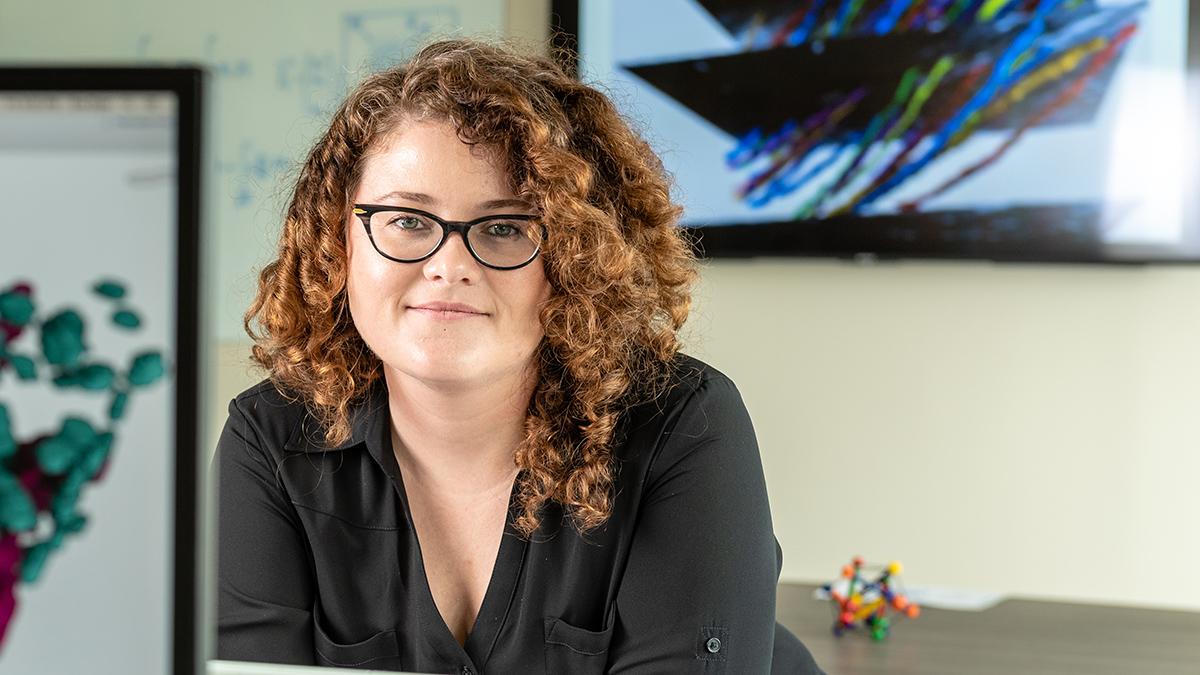Eva Dyer's work at the intersection of machine learning and neuroscience is getting a boost from the Canadian research organization CIFAR. She is one of 18 early career researchers selected for the new group of CIFAR Azrieli Global Scholars, a two-year program designed to accelerate the participants' careers with funding, mentoring, and skills development. (Photo: Gary Meek)
Assistant Professor Eva Dyer has been selected for a program that previous participants have called transformative for the community, mentorship, and foundational research opportunities it provides.
Dyer is among the newest CIFAR Azrieli Global Scholars, a two-year program that aims to accelerate the careers of young researchers with $100,000 of unrestricted research support, mentoring, and a worldwide network. The idea, according to CIFAR — originally the Canadian Institute for Advanced Research — is to foster interdisciplinary collaborations and cutting-edge ideas to address the most important questions facing humanity. Only 18 researchers around the world are part of the new cohort.
Dyer is an assistant professor in the Wallace H. Coulter Department of Biomedical Engineering at Georgia Tech and Emory University. She said the program’s core of building community within her field and well beyond is incredibly attractive.
“They have a number of thoughtful approaches for building community among young researchers,” Dyer said. “As a scholar, you are connected to an amazing network of fellows and advisors for the program, all of whom are luminaries in the field, and provided an opportunity to share your science and get feedback. At the same time, the program connects scholars across different fields and provides opportunities to collaborate and discuss global challenges that need interdisciplinary approaches.”
Dyer’s research lies at the intersection of machine learning and neuroscience. She develops machine learning approaches to analyze and interpret massive, complex neural datasets, and at the same time, works to design better artificial intelligence inspired by the organization and function of the brain. As a CIFAR Azrieli Global Scholar affiliated with the organization’s Learning in Machines & Brains program, Dyer will have access to a senior researcher mentor and focused leadership and communications skills training.
“The Global Scholars program will serve as a catalyst to expand my research program into new areas. I want to learn more about how other fields model and interpret data from complex systems and think more about how we can leverage these ideas into our pursuits toward understanding neural computation,” Dyer said.
CIFAR scholars are in the first five years of their research careers in natural, biomedical, and social sciences or the humanities. The program aims to help this next generation of leaders position themselves for impactful contributions in academia and beyond, according to the organization.
Latest BME News
Jo honored for his impact on science and mentorship
The department rises to the top in biomedical engineering programs for undergraduate education.
Commercialization program in Coulter BME announces project teams who will receive support to get their research to market.
Courses in the Wallace H. Coulter Department of Biomedical Engineering are being reformatted to incorporate AI and machine learning so students are prepared for a data-driven biotech sector.
Influenced by her mother's journey in engineering, Sriya Surapaneni hopes to inspire other young women in the field.
Coulter BME Professor Earns Tenure, Eyes Future of Innovation in Health and Medicine
The grant will fund the development of cutting-edge technology that could detect colorectal cancer through a simple breath test
The surgical support device landed Coulter BME its 4th consecutive win for the College of Engineering competition.








